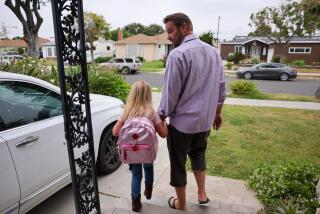My kid, a burnout at 5
- Share via
MY SON ALREADY hates school, and he’s just halfway through kindergarten.
It’s not because his family isn’t pro-school. Daddy has a PhD and is a professor, just like Grandpa was; Grandma has a master’s of science degree, and because Mom is a writer, you can bet little Ricky knew his ABCs well before the first day of class.
We were excited when school began and confident, given his advance preparation and egghead background, that our son would do well.
It took three days before the bad reports started coming in.
“You need to teach your son how to write his name,” the teacher said.
“What are you talking about?” I asked, sure she had my son confused with some other child. “He knows how to write his name.”
“Yes, but he’s writing it in capital letters. He needs to write it in upper and lower case.”
That was when I first noticed that things had changed since I was 5.
The extent of the changes didn’t sink in until after Halloween, when our son brought home an enchanting book he’d made, full of paintings of pumpkins. Yet instead of viewing it with pleasure, it left us feeling depressed. My husband pointed out that school had been in session for more than two months and these were the first pieces of art he’d brought home. Until that point, everything else had been worksheets filled with letters and numbers.
When I was in kindergarten, there were ABCs, finger painting, a nap, and mommy picked you up at noon. Now kindergarten is a 30-hour-a-week job. There’s nightly homework; finger painting is a rare treat; and as for naps, there just isn’t time.
Have the needs of 5-year-olds really changed that much? Not according to Ricky. When I asked him what he liked most about school, he said, “Recess.”
I pressed for something positive. “Don’t you like rug time?” His answer: “No, because I have to just do nothing but sit for a long time.”
“What about seatwork time?” “No, I don’t like it because I have to just work so fast.”
During a talk at our son’s preschool, visiting kindergarten teachers talked up the benefits of having children wait until age 6 to begin kindergarten, rather than enrolling them as soon as they become eligible at 5. “They’ll be really ready, they’ll have the advantage of being the oldest in the class, and when they get to high school, they’ll be the first ones to drive.” And in response to my queries about the rigorous academics we found in kindergarten, my son’s teacher explained that the current kindergarten curriculum was, until five years ago, the first-grade curriculum.
So if we are being advised to wait until age 6 to begin school, and the first-grade curriculum is now taught in kindergarten, the kindergarten I once knew has effectively been eliminated. No wonder there is a drive for universal preschool. Preschool is the new kindergarten.
The reason schools have pushed down the curriculum to younger students? Higher test scores mean more cash, because the state pegs teacher bonuses to academic performance index improvements. So now children are being prodded to work at a level above what may be developmentally appropriate -- especially for those children with “late birthdays” who actually start kindergarten at 4 -- so the schools can earn bonuses for improving performance. But at what cost to the kids?
It seems that advocates of universal preschool believe the solution to problems in our schools is to simply add more school. Yet if the funds proposed to create universal preschool were used to boost teacher salaries and hire more classroom aides, it could make a big dent overnight in the so-called teacher shortage.
Teachers need to spend less time chasing bonuses and more time considering the problems inherent in pressuring children to read a year earlier than they used to, before the existence of API scores and the cookie-cutter Open Court reading program.
If school is drudgery from the start, it’s no wonder that the Los Angeles Unified School District has a high dropout rate. I’m hopeful that kindergarten will one day be a hazy memory for my son, but I’m fearful that it will set the tone for the remainder of his school years.


